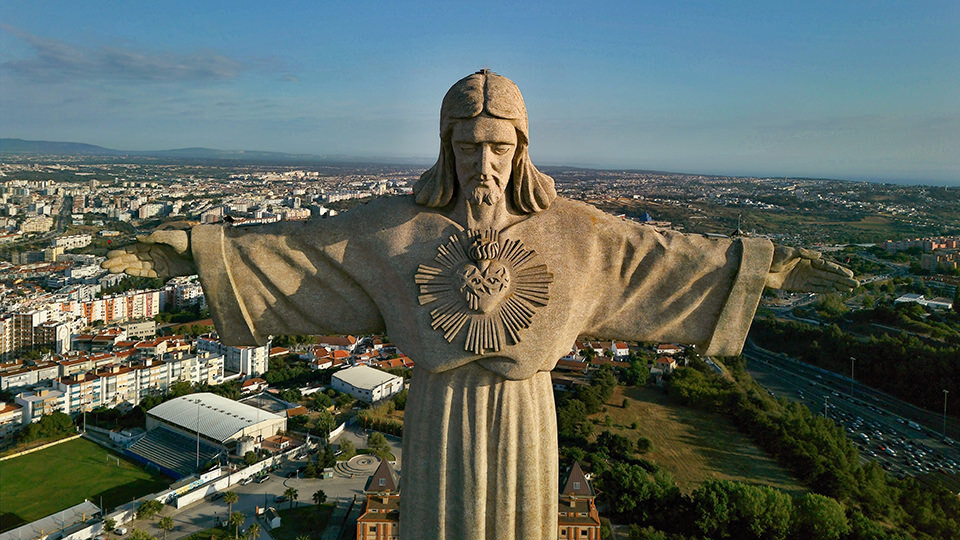

Let your face shine | Reflection for Advent I
Matthew Neugebauer
Saturday, December 2, 2023

An aerial view of the Cristo Rei monument in Almada, Lisbon, Portugal. iStock photo.
Psalm 80
Welcome back to Advent. It’s been waiting for you. That season of longing, of hope, of light piercing the dark, like a candle in a cave or a flashlight in a tunnel.
Advent is the great reminder that even though it sometimes feels like the darkness has won, night is never the end. It always gives way to dawn.
Psalm 80, which we sing together on this first Sunday of Advent, yearns for God’s dawning brightness:
"Restore us, O God; let your face shine, that we may be saved" (v. 19).
The Psalmist, like us during Mass, repeats the plea three times. Are we trying to get God's attention? Or is God directing our attention with a giant, blazing floodlight? Either way, there must be something about God shining his face on us that saves us, heals us, and restores us to him, to each other, and to ourselves.
In the first verse, we cry out to the "Shepherd of Israel...enthroned upon the Cherubim," beckoning him to "shine forth." In his reign as shepherd of his people and king of the angels, he stirs up his might, his authority, to save us. This verse builds on what we heard last Sunday, especially the Gospel story of the shepherd who has the power to separate sheep from goats.
How does the light of God’s face restore us to him, to each other, and to ourselves? What is this strength that he stirs up to save us? We’re led to an answer at the end of the psalm, when we’re reminded of the "reason for the season," of what it truly means for God to "shine forth," to show us his face.
As it turns out, Christians take this literally.
"Let your hand be upon the man at your right, the Son of Man you have made strong for yourself" (v. 17).
The Son of Man comes to shine God's very face on us, comes to look at us and truly see us, with a human face and human eyes. In a “wondrous exchange,” Jesus' human eyes and human face are infused with the Divine Word, with God's very being. Which means that our eyes, our faces, our wills, and our selves become infused with God’s life too – with God's own love, power, and wisdom.
Advent is the reminder that this is both entirely real, but not yet entirely realized. God has truly “set forth in Christ, as a plan for the fullness of time, to gather up all things in him, things in heaven and things on earth” (Ephesians 1:10). At the same time, he includes our lives, our stories, and our struggles in that plan. He even allows war, environmental destruction, political corruption, and decadence to continue, although not as part of his grand plan or as if he actively willed those things to occur. Evil persists in the world as a result of what happens, before “the fullness of time,” when we “claim to take God’s place.” For now, we can still find ourselves turning away from the floodlight of God’s loving face, and “become [our] own worst enemies” (Pope Francis, Laudate Deum, #73).
So the Divine Word, in his mercy and compassion, takes on our flesh (John 1:14). That’s the only way we can have the audacity, the hope, to claim that “we will never turn back from" God, and will remain with him forever. As the Word binds himself with us, we are bound eternally with him, bound in his love for all creation, and made whole in ourselves. God, who has given us his own life, who has planted himself among us, has given us his own eyes to see the goodness of his ways, and his own voice to perpetually call on his name. His Word gives us the grace – the power and conviction – to walk with our neighbours in charity, humility, compassion, and courage, and to turn ourselves back to his smiling gaze.
"Restore us, O God; Let your face shine, that we may be saved."
Related Articles:
<<













